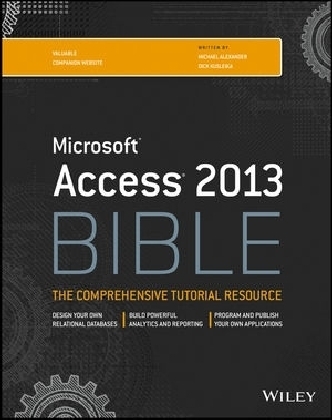
Access 2013 Bible
John Wiley & Sons Inc (Verlag)
978-1-118-49035-8 (ISBN)
A comprehensive reference to the updated and new features of Access 2013
As the world's most popular database management tool, Access enables you to organize, present, analyze, and share data as well as build powerful database solutions. However, databases can be complex. That's why you need the expert guidance in this comprehensive reference. Access 2013 Bible helps you gain a solid understanding of database purpose, construction, and application so that whether you're new to Access or looking to upgrade to the 2013 version, this well-rounded resource provides you with a thorough look at everything Access can do.
Explains how to create tables, manipulate datasheets, and work with multiple tables
Teaches you how to apply the seven-step design method to build databases that are tailored to your needs
Covers building forms with wizards, creating bound and unbound forms, and adding data validation
Shows you ways to automate query parameters, create functions and subroutines, and add programmed error routines
Features a bonus website with content that contains all source code from the book as well as bonus shareware, freeware, trial, demo, and evaluation programs
If you are looking for a comprehensive book on all things Access, look no further than Access 2013 Bible.
Michael Alexander is a Microsoft Certified Application Developer (MCAD) and author of eight books on advanced business analysis with Microsoft Access and Excel. He has more than 15 years of experience consulting and developing Office solutions. Michael has been named a Microsoft MVP for his ongoing contributions to the Excel community. Dick Kusleika has been helping users get the most out of Microsoft Office products for more than 15 years through online forums, blogging, book contributions, and conferences.
Acknowledgments ix Contents at a Glance xi
Contents xiii
Introduction xxxix
Part I: Access Building Blocks 1
Chapter 1: An Introduction to Database Development 3
Chapter 2: Getting Started with Access 19
Part II: Understanding Access Tables 31
Chapter 3: Creating Access Tables 33
Chapter 4: Understanding Table Relationships 89
Chapter 5: Working with Access Tables 129
Chapter 6: Importing and Exporting Data 167
Chapter 7: Linking to External Data 201
Part III: Working with Access Queries 227
Chapter 8: Selecting Data with Queries 229
Chapter 9: Using Operators and Expressions in Access 261
Chapter 10: Going Beyond Select Queries 301
Part IV: Analyzing Data in Access 337
Chapter 11: Transforming Data in Access 339
Chapter 12: Working with Calculations and Dates 363
Chapter 13: Performing Conditional Analyses 389
Chapter 14: Fundamentals of Using Access SQL 407
Chapter 15: Subqueries and Domain Aggregate Functions 427
Chapter 16: Running Descriptive Statistics in Access 451
Part V: Working with Access Forms and Reports 469
Chapter 17: Creating Basic Access Forms 471
Chapter 18: Working with Data on Access Forms 509
Chapter 19: Working with Form Controls 541
Chapter 20: Presenting Data with Access Reports 575
Chapter 21: Advanced Access Report Techniques 631
Part VI: Access Programming Fundamentals 675
Chapter 22: Using Access Macros 677
Chapter 23: Getting Started with Access VBA 715
Chapter 24: Mastering VBA Data Types and Procedures 757
Chapter 25: Understanding the Access Event Model 799
Chapter 26: Debugging Your Access Applications 821
Part VII: Advanced Access Programming Techniques 853
Chapter 27: Accessing Data with VBA Code 855
Chapter 28: Advanced Data Access with VBA 897
Chapter 29: Integrating Access and SQL Server 915
Chapter 30: Customizing the Ribbon 957
Chapter 31: Preparing Your Access Application for Distribution 993
Part VIII: Access and Windows SharePoint Services 1037
Chapter 32: Understanding Windows SharePoint Services 1039
Chapter 33: Integrating Access with SharePoint 1045
Chapter 34: Understanding Access Services 1059
Chapter 35: Deploying Access Applications to SharePoint 1067
Chapter 36: Using Access Data Macros 1089
Part IX: Appendixes 1109
Appendix A: Access 2013 Specifications 1111
Appendix B: Optimizing Access Applications 1117
Appendix C: Understanding Query Performance and Database Corruption 1139
Appendix D: Function Reference for Data Analysts 1147
Index 1183
| Erscheint lt. Verlag | 3.5.2013 |
|---|---|
| Reihe/Serie | Bible |
| Verlagsort | New York |
| Sprache | englisch |
| Maße | 188 x 234 mm |
| Gewicht | 1882 g |
| Themenwelt | Mathematik / Informatik ► Informatik ► Datenbanken |
| Informatik ► Office Programme ► Access | |
| Informatik ► Office Programme ► Outlook | |
| ISBN-10 | 1-118-49035-5 / 1118490355 |
| ISBN-13 | 978-1-118-49035-8 / 9781118490358 |
| Zustand | Neuware |
| Informationen gemäß Produktsicherheitsverordnung (GPSR) | |
| Haben Sie eine Frage zum Produkt? |
aus dem Bereich


